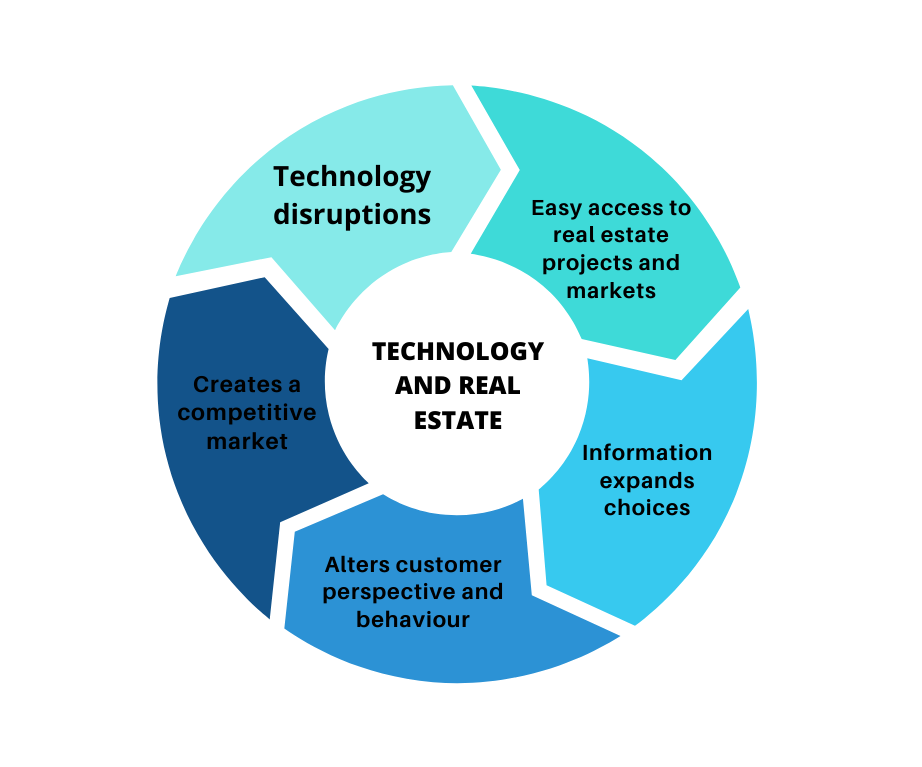
Real estate industry in India is a big contributor to nation’s economic growth. Due to the dual advantages, steady income returns, and collateral value, real estate has proved to be one of the largest asset classes in India. Although pandemic induced market-changes and a sudden shift to work-from-home culture has brought the real estate industry in India to a halt, it is strongly poised for a comeback in the next few months. In this article, we will shed light on some of the figures and statistics pertaining to the Indian real estate sector and how it is expected to bounce back post-pandemic.
Real Estate Industry in India and Its Market Size
- The real estate industry is poised to contribute a total of 13% to India’s economy by the year 2025. It is also expected to reach a market value of USD 1 trillion by 2030.
- 60 million houses will be constructed by 2022 under the House for All scheme.
- By 2022, approximately 100 new malls will be developed pan-India, including 31 in the tier-2 and tier-3 cities.
- The market size of co-working spaces will reach USD 13.02 billion by 2025.
Residential Real Estate: A Possible Outlook
- Walk-ins reduced by 50% and residential sales dipped by 29% in the first quarter of 2020.
- According to KPMG’s “react, adapt, and recover” report, there is substantial demand for residential projects in comparison to supply; hence, the property prices of residential complexes may not get affected.
- Though there has been a significant delay in the decision-making process by the homebuyers due to the pandemic, they will prefer shifting to ready-to-move-in homes designed by reputed developers in the coming months.
- As per the latest report by Knight Frank India, home sales across 8 Indian cities increased from 9,302 in the second quarter to 33,000 plus in the third quarter. The launch of new projects increased 4.5 times during the same period.
- Flexible payment plans and tax incentives may boost sales in the near-term.
- Digital technology and innovative solutions will increase market penetration.
Commercial Spaces
- Mumbai ranks 9th and 12th in real estate development and investment, respectively. The demand for commercial spaces has been on a rise in the financial hub and the trend is expected to continue-PwCs Emerging Trends in Real Estate report.
- Office or co-working spaces may see a decline in demand due to the social distancing norms and changes in user behaviour.
- Although pandemic led to a temporary pause in filing office spaces, more than 600 mn sq. ft. of Grade-A office spaces are available across India’s top seven cities.
Real Estate Investment Trust
The real estate investment trust, which allows individuals to own, finance, or manage income-generating properties has transformed the real estate industry in India. Apart from generating a steady income, REITs are a legitimate way of investing in real estate. The listing of 2 real estate investment trusts—Mindspace Business Parks and The Embassy Office Parks has further instilled confidence amongst other developers, particularly those who wish to invest in the commercial real estate sector. What is important to note is that India’s REIT framework, which ushered a new wave of transparency, pushed India at 34th position on JLL and LaSalle’s Global Real Estate Transparency Index (GREIT).
How Technology Disruptions are Shaping the Real Estate Industry in India?
From land acquisition and construction to designing properties and automation in finance, technology is playing a pivotal role in uplifting the Indian real estate industry. Moreover, the government’s continuous push towards building “Smart Cities” has further accentuated the role of technology in the industry.
But before we look at some of the important statistics pertaining to technology and the real estate industry in India, let us understand the types of technology disruptions.

1. Property Technology (PropTech)
The appearance of PropTech has drastically cut the time and effort associated with property transactions. It has contributed to the objective nature of the process and helped to speed up decision-making and the closure of transactions. This has brought about a vibrant and active market where the properties are sold out almost immediately after the listings, compared to conventional systems.
Moreover, PropTech has been successful in providing equal access to property information for the masses. With big data integration and cloud storage, customers can now review and access a lot of property listings, market trends, and their details from one place. This has given buyers the opportunity to choose wisely, which has resulted in increased turnover of properties and a more educated property market altogether.
Simply put, PropTech is the convergence and application of big data, cloud storage, digital platforms, and AR/VR technology to help clients purchase, sell, and research multiple projects in the market. When it comes to the real estate industry in India, PropTech has:
- Improved customer convenience
- Increased unit sales
- Offers a platform for real estate agents and builders to promote properties through various online tools.
- Shifted the attention from personal interactions to providing top-notch services through apps and marketing methods.
2. Construction Technology (ConTech)
Often used interchangeably, ConTech, on the contrary, involves the use of lean project management principles and innovating technologies in property construction and management. Though at nascent stages in India, ConTech can aid in the development of smart cities and industrial corridors through precast construction technologies, analytics, smart meters, 3D printed houses, etc.
According to a report published by KPMG, technology innovations will have the biggest impact on improving building performance, reducing building costs, and aiding builders and buyers in their decision-making process.
ConTech is a broad term that includes all the different types of solutions, such as robots, augmented reality (AR), apps for the Internet of Things (IoT), and technology or software related to construction management. The main purpose of ConTech is to bring together advanced technologies and building methods to solve problems in the construction field like going over budget, a lack of uniform quality standards, and project delays.
Construction projects need to look at the starting investment and mixing costs for ConTech. These include expenses to improve infrastructure, buy software licenses, deal with integration, and acquire technology. Even though it might be hard at first, using ConTech has benefits like better quality control, fewer mistakes made by people, less money spent, and better budget management.
3. Marketing Technology (MarTech)
Digital channels have been a preferred source for exploring the commercial and residential real estate markets. Moreover, with the onset of the COVID-19 pandemic, the real estate agents, companies, and homebuyers have now become more inclined towards the Marketing Technology (MarTech).
For homebuyers, digital channels offer a platform to explore multiple properties in one go. For realtors and builders, understanding the market trends, gauging their competitor’s performance, and reaching a wider set of audience in a cost-effective way has become possible because of online tools.
According to NAREDCO, real estate digital marketing will become the most important channel to generate leads and promote real estate projects.
Chennai and Mumbai are expected to witness the highest capacity addition due to their advanced infrastructure [JLL’s “Re(imagine) Data Centers Running India’s digital economy” report]
COVID-19 Pause and the Future of Real Estate Industry in India
- The government of India is reviewing its Foreign Direct Investment (FDI) policy to check whether 100% of foreign investments can be allowed in the real estate sector. The idea is to help developers monetize their completed projects during the COVID-19 induced liquidity crisis.
- Though work from home option will impact office demands by 10-15%, it will remain robust in the medium-long term growth. Perhaps, more focus will be laid on splitting-up offices, offering flexible working policies, and developers investing in upgrading offices.
- The emergence of new technologies like the Internet of Things (IoT) and 5G coupled with the digital economy and data protection laws, India’s data center market is poised to offer USD 4.9 billion worth of investment opportunities by 2025.
- The fallout of COVID-19 on the Indian real estate sector underscores the bigger changes required by the rules to help sustain this sector. The process of getting FDI is simplified, and it is also necessary to remove outmoded laws that were hindering business operations.
- After COVID-19, the Indian real estate sector will undergo a transformation that is a result of a mixture of regulatory support, technological innovation, and green and modular solutions. Those aspects are what should lead the industry to a more robust and flexible tomorrow.
Just like other sectors, the real estate industry in India is also at the negative end following the pandemic. Unsold inventories, the decline in sales, and delays in project launches did dampen the sentiments of homebuyers. But with the emergence of full-stack real estate marketing agencies and government-led fiscal and legislative stimuli will push Indian real estate towards recovery in the coming months.

![Well, #GrowWithPropacity is here to educate you all about all things Real Estate.
Follow to stay updated in Real Estate!
[Real Estate, Construction, Real Estate Tips, Real Estate Growth, Real Estate Industry, Carpet Area, Super Area, Built Up Area, Home Buying Tips, Home Buyers, Property]](https://propacity.com/blogs/wp-content/plugins/instagram-feed/img/placeholder.png)
Leave a Reply